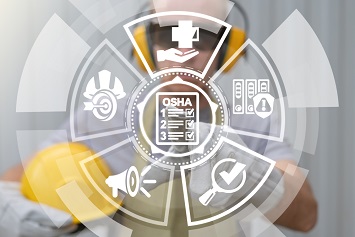The Occupational Safety and Health Administration (OSHA) has adopted revised policies for enforcing workplace safety and health requirements as states throughout the country begin lifting stay-at-home restrictions and workplaces reopen. The changes include updated requirements for recording cases of COVID-19.
Coronavirus disease 2019 (COVID-19) is a respiratory illness caused by the SARS-CoV-2 virus.
OSHA has started increasing in-person inspections at all types of workplaces. However, agency staff will continue to prioritize COVID-19 inspections. An updated interim enforcement response plan has been sent to Area Offices and compliance safety and health officers (CSHOs) handling COVID-19-related complaints, referrals, and severe illness reports. The new enforcement memorandum takes effect May 26, rescinding the agency’s April 13 memo.
In geographic areas where community spread of COVID-19 has significantly decreased, OSHA will return to the inspection planning policies utilized prior to the COVID-19 pandemic. The enforcement directorate instructed area offices to utilize non-formal phone or fax investigations or rapid response investigations in circumstances where the agency historically has performed such inspections.
CSHOs should take appropriate precautions and wear personal protective equipment (PPE) when performing inspections related to COVID-19.
Area Directors (ADs) are instructed to exercise discretion in geographic areas experiencing either sustained elevated community transmission or a resurgence in community transmission of COVID-19. They should continue prioritizing inspections for COVID-19 fatalities and imminent danger exposures. Particular attention for on-site inspections should be given to high-risk workplaces, such as hospitals and other healthcare facilities treating patients with COVID-19 and workplaces with high numbers of complaints or known COVID-19 cases.
Area offices may initiate remote inspections if resources for on-site inspections are not available with an expectation that an on-site component will be performed if and when resources do become available. Where neither an on-site nor remote inspection is possible due to resource limitations, the agency will investigate complaints using a rapid response investigation to identify any hazards, provide abatement assistance, and confirm abatement.
Whenever CSHOs identify a workplace with potential exposure to SARS-CoV-2 and determine that an inspection is warranted under the updated enforcement response plan, they should immediately coordinate with their supervisors and regional office, and, if necessary, contact the agency’s Office of Occupational Medicine and Nursing (OOMN). OOMN can serve as a liaison with relevant public health authorities and can facilitate Medical Access Orders to obtain worker medical records from employers and healthcare providers. The agency has added a new “N-16-COVID-19” enforcement code to the OSHA Information System for tracking investigations involving COVID-19 activity.
Recording COVID-19 Cases
The agency also updated guidance for recording cases of COVID-19. Employers are responsible for recording cases of COVID-19, if:
- The case is a confirmed case of COVID-19, as defined by the Centers for Disease Control and Prevention (CDC);
- The case is work-related as defined by 29 CFR §1904.5; and
- The case involves one or more of the general recording criteria set forth in 29 CFR §1904.7 – death, days away from work, restricted work or transferred to another job, medical treatment beyond first aid, or loss of consciousness.
Given the nature of the disease and ongoing community transmission, it remains difficult to determine whether a coronavirus illness is work-related, according to the agency. Employees may experience potential exposure to the SARS-CoV-2 virus both in and out of the workplace. OSHA’s insists that employers must make reasonable efforts to ascertain whether a particular case of coronavirus is work-related based on the evidence available to the employer.
CSHOs enforcing recordkeeping requirements are instructed to consider the reasonableness of the employer’s investigation into work-relatedness, evidence available to the employer, and evidence that a COVID-19 illness was contracted at work.

